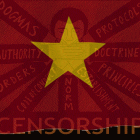1 Oct 2012 | Index Index, Middle East and North Africa, minipost
In a case that has drawn international condemnation, Bahrain‘s highest court today upheld prison sentences handed down to nine medics for weapons possession, incitement and taking part in illegal demonstrations last year. One of the doctors was sentenced to five years, and the remaining eight were given between a month and three years. Their original sentences of 15 years were reduced last June, with nine of the original group of 20 medics being acquitted. A further two remain at large.
17 Sep 2012 | Middle East and North Africa, minipost, News
Yesterday Iran confirmed that its revolutionary guards corps (IRGC) forces are present in Syria helping Bashar al-Assad’s government fight rebel forces. General Mohammad Ali Jafari, Commander of Iran’s Revolutionary Guards, issued a further warning that it would get involved militarily if its Arab ally came under attack. British officials say that the IRGC has provided riot control equipment and technical advice on how to crush dissent, as well as providing support to improve monitor protestor’s use of the internet and mobile phone networks.
6 Sep 2012 | Asia and Pacific, News
 Dissent has suffered a crackdown in Vietnam in recent years, with bloggers often being the main target. Geoffrey Cain asks what has prompted this backlash against free speech (more…)
Dissent has suffered a crackdown in Vietnam in recent years, with bloggers often being the main target. Geoffrey Cain asks what has prompted this backlash against free speech (more…)
10 Aug 2012 | Europe and Central Asia
This week Belarus asked the Swedish diplomatic mission to leave the country and recalled its own embassy from Stockholm. What sparked this international incident? That would be teddy bears. Small, cuddly soft toys.
Alexander Lukashenko, Europe’s last dictator, was angered by a July incident which involved a small aircraft piloted by employees of a Swedish advertising firm entering Belarusian airspace before dropping dozens of teddy bears carrying free speech slogans.
(more…)

